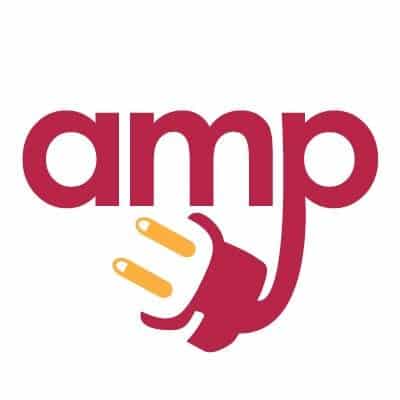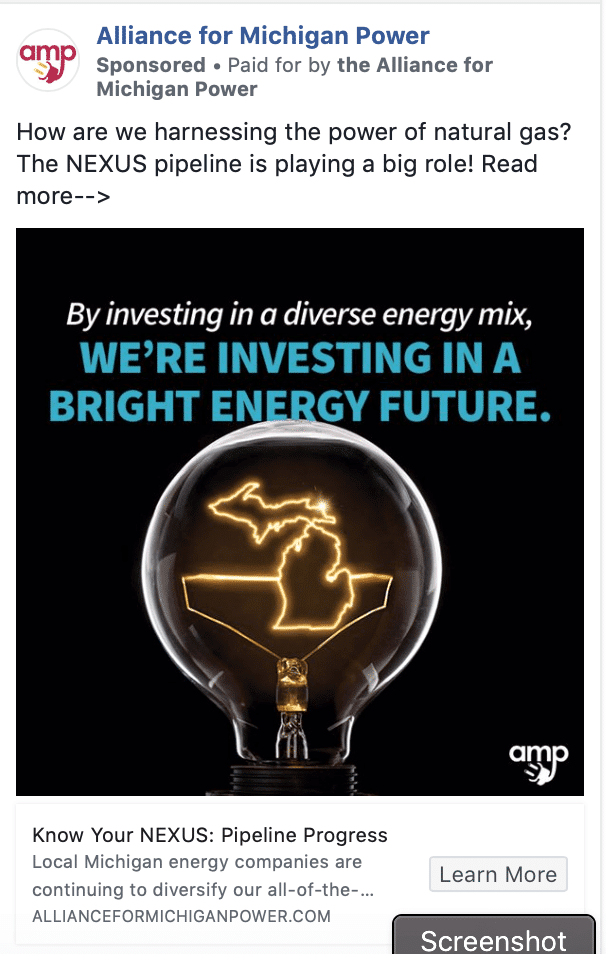Alliance For Michigan Power
Alliance For Michigan Power is an organization with connections to monopoly utility company DTE Energy. Alliance For Michigan Power claims it is a “coalition of more than 30,000 Michiganders who know that reliable, affordable, and sustainable electricity is vital to Michigan’s future.”
The group originated from Michigan Energy First. Michigan Energy First incorporated in December 2014 and filed documents less than a year later to register Alliance For Michigan Power. Michigan Energy First then registered an organization called Michigan Energy Promise in 2019. All three organizations appear to be coordinated jointly as a single entity.

Michigan Energy First’s president is DTE Energy’s Vice President of Corporate and Government Affairs Renze Hoeksema. The treasurer is Theresa Uzenski, a manager of regulatory accounting at DTE Energy. Another board director was Fred Shell, DTE Energy Vice President of Corporate and Government Affairs until he retired in 2016.
An archived page of DTE Energy’s www.journeyto80.com website points visitors to take action with Alliance For Michigan Power to “stay informed and involved in the energy debates that affect all of us.”
DTE Energy spokesperson Peter Ternes told Midwest Energy News that the utility is “part of the Alliance for Michigan Power coalition,” and Hoeksema and Uzenski “serve in an advisory capacity” on the organizations’ boards “to provide information” about issues.
Alliance For Michigan Power’s website features pro-utility talking messages and blogs such as, “Here are five reasons why net metering is brewing a cauldron full of trouble for Michigan,” and “Know Your NEXUS: Pipeline Progress.” It also promoted Facebook advertisements in support of DTE Energy and Enbridge’s Nexus pipeline.

In 2019, Alliance For Michigan Power promoted former Michigan Public Service Commission Chairman John Quackenbush’s opinion piece that attacked net metering and advocated for regulators to continue their pursuit of the “inflow/outflow model.” Critics of the inflow/outflow model say it does not adequately compensate rooftop solar customers for the power they send back to the grid.
This promotion occurred while Michigan Energy First’s other entity, Michigan Energy Promise, was campaigning in support of DTE Energy’s position on net metering and other issues before the Michigan Public Service Commission.
Self-employed political consultant Graham Davis’ LinkedIn profile shows that he worked for the Alliance For Michigan project in 2013 alongside DTE Energy and DDC Advocacy. Davis was the director of digital media at Truscott Rossman, a Michigan-based lobbying and public relations firm, at the time.
One of the first Twitter followers of the Michigan Energy Promise organization was DDC Advocacy Senior Vice President William Bertles. The author of three Michigan Energy Promise grant documents was DDC employee Kevin Wise.
DDC Advocacy is a Washington D.C.-based public relations firm. It won a silver Pollie in the Internet category in 2014 for its work on behalf of DTE Energy on the Alliance for Michigan Power website. According to the American Association of Political Consultants website, the Pollie Awards are “the most prized and sought-after awards in the political communications and public affairs industries.”
The CEO of Truscott Rossman, John Truscott, managed the public relations for the 2012 DTE Energy and Consumers Energy-funded campaign to fight a 25%-by-2025 renewable portfolio standard ballot proposal. Truscott Rossman’s website boasts of its success working with the utilities to get energy legislation passed in 2016.
Ron Fournier, president of Truscott Rossman, is the spokesperson for Michigan Energy Promise. Fournier is the former editor of Crain’s Detroit Business and a former senior political columnist at the conservative National Journal magazine.
Michigan Energy First has paid Truscott Rossman a total of $649,385 between 2015 and 2018, according to its tax filings.
Alliance For Michigan Power got involved in Michigan’s 2018 elections. In the Republican primary for the 24th Senate District, Alliance For Michigan Power sent mailers in support of Brett Roberts, who ran and lost against Representative Tom Barrett. Months earlier, Rep. Barrett had slammed the PSC for effectively ending net metering in the state:
“This short-sighted decision is beyond what the legislative directive was in the 2016 energy bill, which sought to ensure that rooftop solar users were covering their grid costs … This decision makes it harder for farmers to find solutions for their families and businesses. I am dedicated to working with the governor and legislative leaders to fix this decision.”
Michigan Energy First’s contributions
Michigan Energy First has received over $46 million in contributions since 2014, including $18 million in revenue in 2018, according to its IRS 990 filings. Michigan Energy First had $12.1 million in assets at the end of 2020.
The table below shows how the DTE Energy-connected 501c4 has contributed millions of dollars to other 501c4s and political organizations.
Recipients include several conservative 501c4s such as the Michigan Freedom Fund, Michigan Conservative Values, and Conservative Leadership & Values Coalition.
Recipients also include several groups that were part of Michigan Energy Promise – another front group associated with Michigan Energy First that was created to support DTE Energy’s position on net metering and other issues before the Michigan Public Service Commission. In 2019, Michigan Energy First contributed money to the Detroit Association of Black Organizations, New Faith Temple Community Development Corporation, and the Arab American & Chaldean Council – all were part of Michigan Energy First and also received money from the DTE Energy Foundation.
Another recipient of Michigan Energy First money includes Maslansky + Partners, a firm that the trade association for investor-owned utilities, the Edison Electric Institute, hired to repair the utility industry’s public image. Some of Michigan Energy Promise’s talking points appear to be straight from the playbook Maslansky + Partners created for EEI. One of the firm’s recommendations to the industry was to rebrand rooftop solar as “private solar” and call utility-scale solar “universal solar.”
Michigan Energy First 990s: 2020, 2019, 2018, 2017, 2016, 2015, 2014.
Alliance for Michigan Power’s Ad Spending
Utilities continue to stall and limit climate action by funding front groups to spread climate misinformation and false solutions to solve the crisis through advertising on social media networks.
Using data from the Meta Ad Library API and existing code from Brown University, EPI created a tool to expose the amount Alliance for Michigan Power is spending on advertisements about social issues, elections, or politics across Meta technologies, along with the specific regions the advertisements target.

